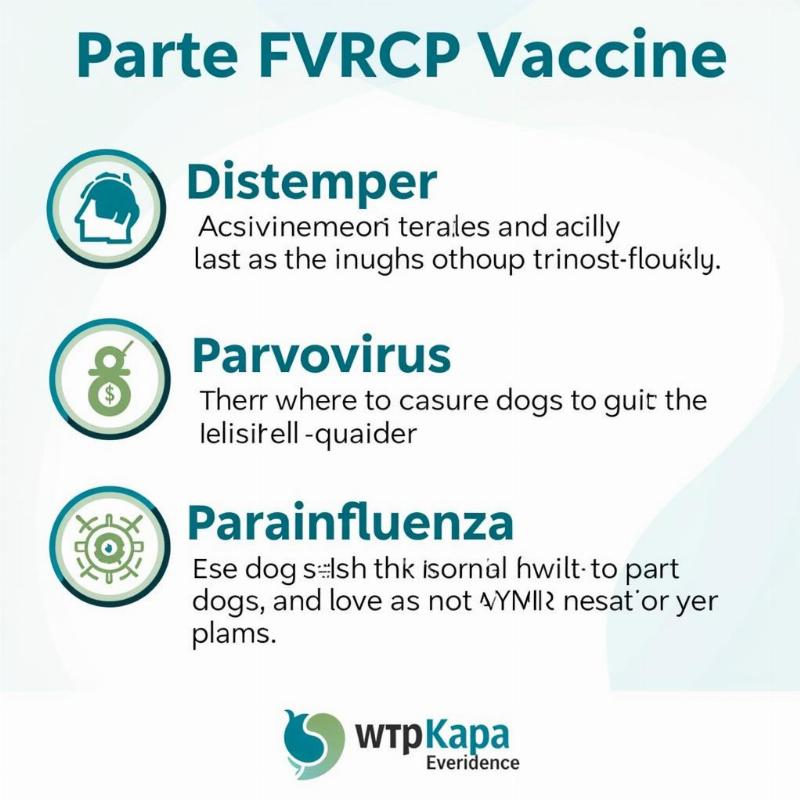The FVRCP vaccine is one of the core vaccines recommended for all dogs in the US. It protects against three highly contagious and potentially deadly diseases: feline viral rhinotracheitis (FHV-1), calicivirus (FCV), and panleukopenia virus (FPV). While the name might suggest it’s for cats (and there is a very similar feline version), the canine version is essential for safeguarding your furry friend’s health. Understanding what this vaccine is, why it’s important, and what to expect is crucial for every responsible dog owner in America.
Decoding FVRCP: Understanding the Individual Components
The FVRCP vaccine is a combination vaccine, meaning it protects against multiple diseases with a single shot. Let’s break down each component:
-
Distemper: This severe viral illness affects a dog’s respiratory, gastrointestinal, and nervous systems. Symptoms can range from mild cold-like symptoms to seizures, paralysis, and even death. Distemper can be particularly dangerous for puppies and older dogs.
-
Parvovirus: Often referred to as “parvo,” this highly contagious virus attacks the gastrointestinal tract, causing severe vomiting, diarrhea, and dehydration. It can be life-threatening, especially for puppies who haven’t yet developed a strong immune system.
-
Parainfluenza: This virus causes kennel cough, a highly contagious respiratory infection. While typically not fatal, kennel cough can lead to more serious complications, especially in puppies or dogs with weakened immune systems.
 FVRCP Vaccine Components
FVRCP Vaccine Components
Why is the FVRCP Vaccine So Important for Dogs in the US?
These diseases are prevalent throughout the United States, making vaccination vital for protecting your dog. Even if your dog primarily stays indoors, they can still be exposed to these viruses through contact with other animals, contaminated surfaces, or even airborne particles. The FVRCP vaccine is the most effective way to prevent these potentially devastating illnesses. It not only protects your individual dog but also contributes to herd immunity, reducing the overall spread of these diseases within the dog population.
FVRCP Vaccine Schedule: What to Expect
Puppies typically receive a series of FVRCP vaccinations starting at around 6-8 weeks of age, with boosters given every 3-4 weeks until they are about 16 weeks old. Adult dogs typically require booster shots every 1-3 years, depending on their lifestyle and risk factors. Your veterinarian can recommend the best vaccination schedule for your dog based on their individual needs and local disease prevalence.
Potential Side Effects of the FVRCP Vaccine
While the FVRCP vaccine is generally safe, some dogs may experience mild side effects, such as soreness at the injection site, lethargy, or a low-grade fever. These side effects are usually temporary and resolve within a day or two. In rare cases, more serious allergic reactions can occur. Always monitor your dog closely after vaccination and contact your veterinarian if you notice any unusual or concerning symptoms.
Addressing Common Concerns about the FVRCP Vaccine
Some dog owners express concerns about the safety and necessity of vaccines. However, the benefits of the FVRCP vaccine far outweigh the risks. The American Veterinary Medical Association (AVMA) and the American Animal Hospital Association (AAHA) strongly recommend the FVRCP vaccine as a core vaccine for all dogs. Vaccinating your dog not only protects their health but also contributes to public health by preventing the spread of these diseases.
Conclusion: Protecting Your Canine Companion with the FVRCP Vaccine
The FVRCP vaccine is a crucial part of responsible dog ownership in the United States. It provides essential protection against three serious and potentially fatal diseases: distemper, parvovirus, and parainfluenza. By vaccinating your dog, you not only safeguard their health but also contribute to the overall well-being of the canine community. Talk to your veterinarian about the FVRCP vaccine and ensure your dog is up-to-date on their vaccinations.
FAQ
- How often does my dog need the FVRCP vaccine? Your veterinarian will recommend the appropriate schedule, typically starting in puppyhood and continuing with boosters every 1-3 years.
- What are the common side effects of the FVRCP vaccine? Mild side effects can include soreness, lethargy, and low-grade fever, which are usually temporary.
- Is the FVRCP vaccine safe for puppies? Yes, it’s crucial for puppies to begin their vaccination series early to protect them from these diseases.
- Can my dog still get sick even after vaccination? While the vaccine is highly effective, it’s not 100% guaranteed. However, vaccinated dogs typically experience much milder symptoms if they do become infected.
- Where can I get the FVRCP vaccine for my dog? Your veterinarian can administer the FVRCP vaccine.
Beautdogs.us is your trusted source for comprehensive and engaging information on dog care and companionship in the US. We provide expert advice on dog breeds, grooming, training, nutrition, and much more. Whether you’re a new dog owner or a seasoned pro, Beautdogs.us is your go-to resource for all things canine. Contact us today for personalized advice and support. Email: [email protected], Phone: +1 501-555-7529. Visit Beautdogs.us for more valuable insights and expert tips on dog care.